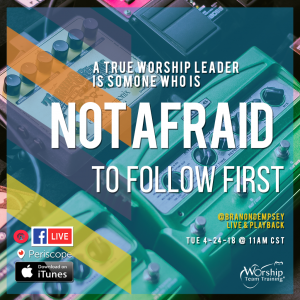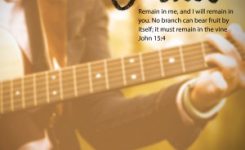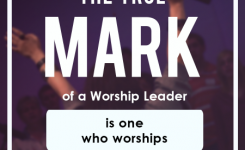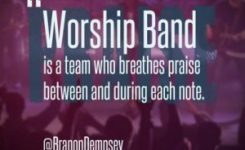Leaders, WTTU Special Public Post
Show #164 | “The Power of Music”
Time: 30m video
Music is Powerful
As a Worship Leader, do you struggle with getting the younger kids at your church involved with music and worship? How can you incorporate students with your worship team?Why is it important to start teaching your children to worship the Lord through music at a young age?
Learn how to begin to incorporate music and worship with children, and why it is so important to the long term health of your worship ministry.
WATCH SHOW #164
Also Watch Live by: FacebookLive or Periscope
Music Should Be A Priority
If I sat as Queen in the palaces of learning, all children would study music as a first priority.That’s not because every student is going to become a professional musician but because the study of music builds and coordinates the body and the brain, optimizing and readying a child for greater success in all educational endeavors.
Crazy, you say? Isn’t music simply an extra-curricular activity? Aren’t the arts mere entertainment, a distraction from the “real world” of Science, Tech, Engineering, and Math—the lauded STEM subjects? Isn’t music only for the talented?
These and other myths keep countless children from realizing their full potential. They are based on a faulty view of the performing arts and of child development.
The truth is this: we are not just minds in bodies. We have a heart, a soul, an imagination, and a body that is a temple for the Holy Spirit. We have a yearning, deep inside us, to participate in something communal, something larger than ourselves, something creative, something inspired. The arts fulfill that God-given desire.
[ctt template=”6″ link=”7Pl1I” via=”no” ] “That’s why, for the Christian, music is a Spiritual discipline, a required practice of Scripture.”[/ctt]
Music is not simply for the talented. It is for everyone. Music is the path to higher math–in fact, music is math! The ancients saw music and math as inseparable, and so should we.
Music also unlocks verbal skills. Its rhythms and emotions, climaxes and cadences, harmonies and modulations, are a pathway to our storytelling. The composing of music to accompany words is as old as Miriam coining the Song of Moses in the book of Exodus: “Horse and rider He has thrown into the Sea!”
Like Miriam, all Christians are commanded to “Sing a new song”. That act of creation requires searching our lives for the action of God, putting what we find into words, setting those words to music, and sharing what we have composed. Thus the songs we create—and the songs we learn from our families and mentors–extol the works of God.
Particularly relevant to child development, songs tuck the miracles of God into the most protected reserves of memory. Songs learned during childhood are resistant to decay, researchers have found, so that even stroke or dementia can’t completely steal them.
That’s why, for the Christian, music is a Spiritual discipline, a required practice of Scripture.
Remember that the Hebrews sent singers and musicians into battle at the front lines, before the soldiers. They believed that a song of praise pushed back unseen demons and prepared the spiritual world for victory. They were right. All battles begin in the spiritual world, and music indwells both heavenly and temporal realms.
“As the students in our Kingdom move on stage and excel on their instruments, they are learning what happens between and around notes. They are learning how phrases land, heavy or light, ascending or descending, sustained or staccato. They are feeling melodies rise and soar or crash to dark despair. They are learning of life, and how to swaddle the bumps of life in the buffer of imagination.”
The book of Job indicates that God used music in the creation of the world, and in Revelation, we learn that music plays before the throne of God without ceasing. That’s how important music is in Heaven. But how do we capture that creative power to lift the praise of God here on earth?
The Kingdom of Music
Allow me to paint a picture for you. Imagine an earthly Kingdom of Music in which all subjects possessed an artistic voice and could compose and tell their God-stories with such riveting skill that the world would clamor to hear. Let’s go there for a moment.No longer, in our Kingdom, is the realm of music dominated by a handful of “superstars” who are carbon copies of the day’s pop fads. Instead, every community blooms with exuberant indigenous color. All citizens take joy in serving as performer or audience–in witnessing innovation first-hand.
Instead of heading to Vegas or Nashville, LA or New York City, the caravans pool toward such places as Frogville, Texas or even my home-corner, Zafra, Oklahoma, so small that to call it a town would be overstepping.
Much of the time, people in the Kingdom of Music don’t even have to get on the road to enjoy the arts, because they are all participants. They are all artists.
In this world, the newborn child moves front and center. From birth to kindergarten, children listen and sing-a-long to music, trilling and dancing with uninhibited joy, their favorite thing to do!
In elementary school, grades 1 through 4, they continue moving and singing to music, while adding the practice of an instrument, one sized to fit their little hands. Twice a week, they take a 30-minute lesson in their chosen instrument, and for an hour each day, they participate in a small-group practice with peers. These classes include eurhythmics, the embodiment of musical expression, a required class in our Conservatory.
Teachers refrain from making comparisons, and students, instead of indulging in rivalries and suffering jealousies, encourage each other. Caregivers are welcomed to the sessions and prompted to take notes in order to participate in practice at home.
During the same early elementary years, children begin appearing onstage, learning to embody the rhythm and emotion of music and to perform effectively. This embodiment is important, because music is not simple arithmetic; four quarter notes equal a whole note. It is geometry and physics.
As the students in our Kingdom move on stage and excel on their instruments, they are learning what happens between and around notes. They are learning how phrases land, heavy or light, ascending or descending, sustained or staccato. They are feeling melodies rise and soar or crash to dark despair. They are learning of life, and how to swaddle the bumps of life in the buffer of imagination.
Enter books. In our imaginary Kingdom, children learn to read and write the language of music at the same time as they learn to read and write the language of words. In the same way that the written word opens worlds to a child, so too do melodies and harmonies, notes and rests–the written vocabulary of music.
By the age of 10, when children are getting ready to graduate to middle school, they are fluent readers of both books and music. They are versatile singers and players of an instrument. And they are savvy and fearless performers, communicating skillfully and persuasively from the stage.
In our Kingdom’s middle schools, children may wish to expand their musical dialects, adding a second instrument, perhaps one that dove-tails with the first—violin with mandolin, say, or harp with piano. Or, if their first instrument is melodic, say, flute or violin, they might embark on such a harmonic instrument as guitar or piano, to enrich the tonal palette in preparation for more complex forms of composition.
They begin to compose songs that reflect their life experiences. Their peers enjoy listening, and the young performers enjoy the interaction. Their music, begun so early, is innate and natural, like breathing or speaking. It doesn’t have to go away to make time for other interests.
During early adolescence, the brain begins to cull unused synapses and build new ones, according to the lines of study pursued. The music students’ neurological pathways are more engaged than those of non-musicians in neighboring kingdoms, and they will not be culled. Throughout life, our students’ brains will remain heavier, denser, and more connected.
For the students of our Kingdom, who have been marinating in this world of music, high school is a particularly rich season. High school arts don’t need to vie with sports, because the greatest demands of time and money have already been invested in music, back in elementary and middle school, when sports didn’t demand as much time. Our high school students are mature musicians, easily turning their highly functioning minds to other pursuits.
Music undergirds their lives. The oxytocin that music pumps into the bloodstream builds firm ties with family and friends. Oxytocin, the same hormone that bonds nursing newborns and their blissful mothers, heightens musicians’ feelings of generosity and good will toward one another.
In our imaginary kingdom, these creative seekers are not alone. See how well all the whiz-kids in the math department play their instruments? Hear how well the football team sings?
Notice how, in our Kingdom, the quarterback and running back exceed all expectations. The visuospatial skills that music has wired between the quarterback’s eye and arm allow him to throw a football with extraordinary precision. And how nimble and quick is the running back–his sense of timing and rhythm is uncanny!
But look over here: The rigor of the debate team rivals that of the sports teams. The poetry club, too, has filled the Kingdom’s trophy case, and the drama class is writing and producing an original play. The advanced math and science classes are full—full of students in whom music has boosted advanced abstract thinking skills.
Their heads whirring with sonnets, blueprints, or experimental proofs, our students vie for competitive teams, emboldened by their experience of musical composition and performance to experiment and take success or failure in stride.
Tomorrow’s politicians and lawyers, astronauts and landscape architects, they have mastered the ability to reach and field, pivot and lead. They have being doing so since stepping onto the performance stage at age seven, and they are confident that they have something unique to offer.
Clever and creative, these students offer the mix of attributes for which an employer in the age of Google is on the prowl. As jobs are increasingly claimed by Artificial Intelligence, employers will search for workers who can do something that robots can’t. Those who think creatively, who project imaginatively, who are fearless performers and natural communicators—those will be the leaders of the future.
Music Develops Leaders
The successful study of music develops just such leaders. And that word, successful, is the fulcrum on which my thesis pivots. Skill in music is accomplished by practice+time. It is best begun early, with focused engagement that increases as a child grows. If it is well taught, it will be a beloved endeavor, steadily increasing in excellence.Many music-study testimonies are tales of woe, of lessons abandoned for lack of practice or waning interest, of incompetent teachers and pitiful programs that spit out students who can hardly read music, much less notate to compose or orchestrate or perform. Some students thrive in the early years but, as they grow, cannot find a social context for their music and lose interest, poco a poco, until they give up.
This is why music education must change. We were not created to be solitary geniuses dreaming up some new invention or composition for our own glory. We were meant to commune with one another. In music education, we must begin to prioritize community and creativity, as well as technique. We must plow a path from the practice room to the performance hall so young musicians can see how their work fits into the world around them.
What about those children who thrive in the Kingdom’s lines of musical grooming but don’t go on to become musical professionals? Did we fail them? Did we waste their time and money? We did not!
Music demands the use of all parts of the brain simultaneously and in coordination. This engagement of the childhood synapses—all one thousand trillion of them — builds a broad-band connection that plows lifelong paths of innovation. That’s good news for a young child.
Here is the gospel truth: Music transforms children. It moves the heart, opens the mind, shapes the brain, and unlocks the voice. It is not just for the talented. On the contrary, it is for the un-talented. It is for the children afraid to speak publicly, the children who struggle with hand-eye coordination, the children who enter a room and hide, unsure that they “fit in.”
Share the Music
God made music for us. Let’s teach it to everyone. Let’s teach it better. Let’s rediscover its power and beauty in the shining eyes of our children.@AnnieMosesBand @BranonDempsey @worshiptt @WorshipTTU
Want to watch MORE Worship Team Training Videos?
Not a WTTU Member, or Choose to Upgrade? Update Now
 Worship Team Training® Is your worship team stuck? Want worship leading to be better? Want to be free? We can take you there. Inspire, create and transform the leading of worship. Get a WeekendWorkshop
Worship Team Training® Is your worship team stuck? Want worship leading to be better? Want to be free? We can take you there. Inspire, create and transform the leading of worship. Get a WeekendWorkshopCopyright 2017 Worship Team Training®










